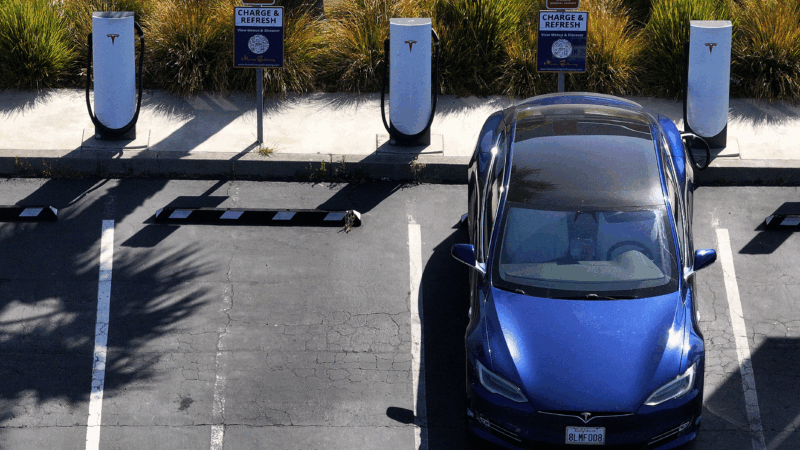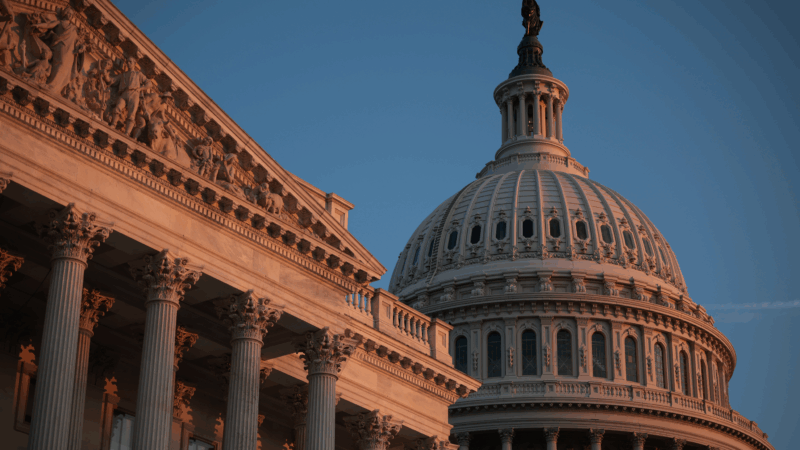Senate considers ditching the EV tax credit even earlier than planned
The Senate’s version of the giant tax and spending bill might eliminate tax credits for electric vehicle purchases even sooner than the House version.
The House bill called for those tax credits to end in late 2025 for some carmakers, and 2026 for others.
The draft that the Senate released over the weekend sets a single termination date: Sept. 30th, three months from now.
But the megabill is far from finalized. The Senate is currently voting on potential amendments to their version, and after that the House and Senate versions would still need to be reconciled.
But for EV advocates who had hoped the Senate would extend the life of the EV tax credits, the draft released over the weekend was a blow.
“To vote for this bill as written is to effectively abandon the goal we all share of making the United States globally competitive in the mineral, battery, and vehicle production markets of the future,” Albert Gore III, the executive director of the Zero Emission Transportation Association, wrote in a statement.
Meanwhile, the Trump-aligned American Energy Alliance celebrated the prospect of rapidly terminating EV tax credits. “Extending green giveaways on the backs of American taxpayers is shortsighted and neglectful,” the group’s president, Tom Pyle, wrote in a statement.
In an interesting development, the nation’s auto dealers — who, during the Biden administration, were vocally skeptical of electric vehicles — have been lobbying to keep the EV tax credits in place for longer. The National Automobile Dealers Association has urged Congress to include what they call “a reasonable transition period.”
“An abrupt repeal of the EV tax credits would disrupt the car market and cause unnecessary consumer confusion,” the group wrote in a statement emailed to NPR. And Carmax and Carvana, two nationwide used-vehicle giants, joined an open letter calling for credits to continue “for at least the next several years,” arguing that sudden elimination would be too disruptive to the used auto market in particular. The current tax credit includes a used vehicle credit, worth up to $4,000 per car, explicitly designed to bring EVs within reach for lower- and middle-income car shoppers.
Sen. Bernie Moreno (R-Ohio), a former car dealer and a vocal critic of EVs, laid out part of the Republican argument against the tax credits in remarks on the Senate floor over the weekend. He raised the hypothetical example of a billionaire who decides to lease a $500,000 electric Rolls-Royce. “The Democrats gave that billionaire a check for $7,500,” he said. “They say we’re helping billionaires, when they’re giving $7,500 checks to people who lease these cars. Sick.”
It’s true that the tax credit for leasing an EV — sometimes called the lease loophole — does not have the same income and price restrictions as the rest of the EV tax credits.
EV tax credits were not the only green provision to get more radical cuts from the Senate’s weekend draft than they did in the House bill. The Senate is considering not only pulling tax credits for wind and solar projects, but adding new taxes on those renewable energy sources, unless companies can prove they don’t use Chinese components. And the Senate might eliminate all fees on automakers who don’t comply with fuel economy rules, which environmental groups say would make those regulations toothless.
On the other hand, not every rollback of EV policy contained in the House version of the bill survived the Senate’s revision process. A new yearly fee on electric vehicles and hybrids was not in the latest version (though it may return in a separate bill). Neither was a proposal to eliminate the Environmental Protection Agency’s rules for tailpipe emissions standards.
Team USA faces tough Canadian squad in Olympic gold medal hockey game
In the first Olympics with stars of the NHL competing in over a decade, a talent-packed Team USA faces a tough test against Canada.
PHOTOS: Your car has a lot to say about who you are
Photographer Martin Roemer visited 22 countries — from the U.S. to Senegal to India — to show how our identities are connected to our mode of transportation.
Sunday Puzzle: TransformeR
NPR's Ayesha Rascoe plays the puzzle with listener Joan Suits and Weekend Edition Puzzlemaster Will Shortz.
Looking for life purpose? Start with building social ties
Research shows that having a sense of purpose can lower stress levels and boost our mental health. Finding meaning may not have to be an ambitious project.
Danish military evacuates US submariner who needed urgent medical care off Greenland
Denmark's military says its arctic command forces evacuated a crew member of a U.S. submarine off the coast of Greenland for urgent medical treatment.
Only a fraction of House seats are competitive. Redistricting is driving that lower
Primary voters in a small number of districts play an outsized role in deciding who wins Congress. The Trump-initiated mid-decade redistricting is driving that number of competitive seats even lower.






